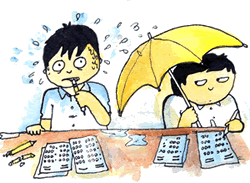
The Meaning of High-Stake Assessment
High-stakes assessments are typically standardized tests used for the purposes of accountability—i.e., any attempt by federal, state, or local government agencies to ensure that students are enrolled in effective schools and being taught by effective teachers.
In general, “high stakes” means that important decisions about students, teachers, schools, or districts are based on the scores students achieve on a high-stakes test, and either punishments (sanctions, penalties, reduced funding, negative publicity, not being promoted to the next grade, not being allowed to graduate) or accolades (awards, public celebration, positive publicity, bonuses, grade promotion, diplomas) result from those scores.
 |
| When tests and teaching are both matched to the set standards, students perform well on the test. |
There are different types of tests that students typically take in a school year. One test the teacher creates and bases it on the information that has been provided in the classroom within a particular span of time. It provides information to the teacher, the parent and the student describing how much of a grasp the student has on the material.
Another test is a standardized test. Typically students take this test once each year to gauge their understanding and abilities in math, reading and writing. This provides the state and each school district a broader view of where students are in these subjects.
The Purpose of the High-Stake Assessment and The Way it is Conducted
High-stakes tests come in many forms and may be used for a wide variety of purposes, the following provide a brief overview of a few representative applications of high-stakes testing:
Students: Test results may be used to determine whether students advance to the next grade level or whether they receive a diploma. For example, a growing number of states require students to pass a reading test to advance from third grade to fourth grade, while others require students to pass a test to graduate from high school.
Educators: Test results may be used in the job-performance evaluations of teachers or to determine professional compensation. For example, in recent years more school reformers, elected officials, and policy makers have been calling for teacher pay (including bonuses), as well as hiring, firing, and tenure decisions, to be partly based on student test scores.
Schools: Tests results may be used to trigger penalties for schools, including negative public ratings, the replacement of staff members, or even closure. For example, some federal and state policies require that test results be used to impose a variety of consequences, such as firing or transferring some or all of a school’s administrators and faculty, or forcing a school to pay for additional services and transportation costs for students. In addition, standardized-test scores are also increasingly being used, along with other measures, in various state and independent efforts to assign A–F letter grades to schools.
My personal's view/ reflection/ opinion about the issues raised by the assessment
Supporters of this style of testing claim that it is the best way to track nationwide student progress and keep the same educational standards across the country.
However, one of the criticisms of current standardized testing is that because they are high-stakes, they create a lot of stress for the students taking them. This may create invalid results if the student performs worse on the test under stress.
While the debate around high-stakes standardized testing heats up, their effects are being felt by students and teachers as well as their schools and communities across the nation.
The Suggestion and Ways to Improve High-Stake Assessment
The ways to improve high-stake assessment are :
First, we must know that every pupil have their own different intelligence, standardized-test is not fair to every student.
Assessment for the student not support to be standardize, but should be diversify.
Thus, every capacity of the student will be developed well.
Second, the focus zone of the parents, teachers, school or the government should be more on the growth of the student, but not on the test.
What we always get wrong were,
" How many marks did you get for the exam?"
" What grade are you?"
" Are you in the Dean's list?"
But, we never ask,
" Did you satisfied with you own result?"
" What will you do next?"
A very famous Chinese's proverb said that,
One may distinguish himself in any trade.
Every trade has its master.
In any profession there is some one who excels all the rest.
Every profession produces its own leading authority.
Therefore, a good result not means that the personality of the student is good; A bad results not means that the personality of the student is bad. Result doesn't means anythings.
The growth of the student is most important than the result, so, try to encourage the student more, while the student feel value. The student's physical and mental will be more robust.
Bibliography
Taylor, D. (1 February, 2014). Part 2:
High-Stakes Testing Opting Out : The Type of Tests . Retrieved from
Parents Across America:
http://parentsacrossamerica.org/part-2-high-stakes-testing-opting-out-types-tests/
Vanderbilt University. (2015). Why do you think
Ms. Flores describes the testing as “high stakes?”. Retrieved from The
Iris Center:
http://iris.peabody.vanderbilt.edu/module/hst/cresource/q1/hst_04/#content
YANOS, T. F. (24 May, 2013). The Rise of
High-Stakes Standardized Testing. Retrieved from IndyKids:
http://indykids.org/main/2013/05/the-rise-of-high-stakes-standardized-testing/






No comments:
Post a Comment